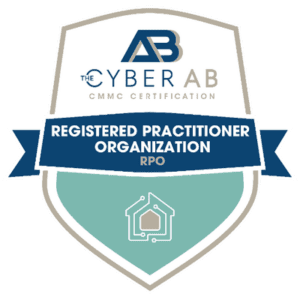Cybersecurity: as a business owner, this is probably a word you are hearing more and more. And although it may seem like a buzzword or a trending business topic, in today’s digital landscape, it is a crucial part of your business plan. Because of an ever-evolving hybrid environment, organizations (both large and small) need to prepare for cybersecurity attacks!
The cost of being unprepared is substantial.
According to the Cisco Cybersecurity Readiness Index, a double-blind survey of 6,700 private sector cybersecurity leaders in 27 global markets representing 18 industry sectors, 41% of organizations affected by a cybersecurity incident had to pay at least $500,000. Additionally, 82% of respondents said they expect a cybersecurity incident in the next 12 to 24 months.
Plus, if your company is doing business, or planning to do business, with the Department of Defense, you are required to protect government information. The Defense Federal Acquisition Regulation Supplement (DFARS) clauses apply to prime and subcontractors and describe expectations for the handling of Controlled Unclassified Information (CUI) in non-federal systems, in compliance with the National Institute of Standards and Technology (NIST) Special Publication (SP) 800-171 Rev. 2. We cover the ins and outs of this in our blog, The Fundamentals of Completing the NIST Basic Assessment, here.
So, is it too late to prepare?
No. In fact, the same study cites that only 15% of organizations globally have a cybersecurity position mature enough to defend against the risks of the hybrid world. Having a plan, while a step in the right direction, is not enough. Regular testing through tabletop exercises is crucial to ensure the effectiveness and efficiency of the response process. In this blog post, we will delve into the importance of developing an incident response plan and conducting tabletop exercises.
THE SIGNIFICANCE OF INCIDENT RESPONSE PLANS
An incident response plan can guide your organization’s response in the event of a cybersecurity incident by proactively outlining the necessary steps and assigning responsibilities to minimize the impact of a breach and expedite recovery. While you may be looking for a quick incident response plan template, your cybersecurity plan should be more customized to your unique business needs. Below, discover why a well-planned incident response plan is a necessary investment for your business:
- Minimize your downtime. Time is money, and an incident response plan provides a structured approach to identify, contain, and mitigate the impact of a cybersecurity incident without delays. By minimizing downtime, you can reduce financial losses associated with disruptions to business operations, revenue loss, and regulatory fines.
- Lower those premiums. Think of an incident response plan as checking the box next to that non-smoker option on your health insurance plan. Just as your personal health can influence your health insurance premium, your cybersecurity health can impact your cybersecurity insurance costs. Boiled down, the better your cybersecurity protection plan, the lower your premium costs.
- Protect your assets. An incident response plan ensures a systematic and organized approach to safeguarding your critical data, intellectual property, customer information, and other valuable assets. By defining the appropriate response actions, organizations can prevent further compromise and potential data breaches.
- Don’t lose your customers. Effective incident response plans demonstrate a commitment to data security and customer protection. Promptly addressing cybersecurity incidents and communicating transparently with stakeholders can help preserve customer trust and safeguard the organization’s reputation.
- Meet the necessary requirements without worry. There are many industry-specific regulations that mandate businesses to implement proper incident response plans. To avoid legal consequences and penalties, it’s critical that you are prepared.
TABLETOP EXERCISES: TESTING AND STRENGTHENING INCIDENT RESPONSE PLANS
So now, with your incident response plan nailed down, assessing it through tabletop exercises will ensure your plan is ironclad. Tabletop exercises simulate realistic scenarios in a controlled environment, allowing you to evaluate the capabilities of your incident response plan. Here’s how:
- Tabletop exercises reveal gaps in your incident response plan, illustrating how to refine your processes, update procedures, and address weaknesses proactively. By learning from simulated incidents, you’ll feel ensured with your overall preparedness .
- In addition, tabletop exercises assess your internal and external communication channels to ensure that information flows smoothly and efficiently. This will help foster collaboration among your team and strengthen coordination during a real incident.
- A fire drill, without the alarms. Provide your employees the chance to familiarize themselves with their roles and responsibilities. By practicing the incident response plan in a controlled setting, your staff will develop the skills needed to respond in a real-life scenario.
There are several cybersecurity frameworks and standards that serve as valuable references for you to develop your cybersecurity incident response plan and tabletop exercises, including the NIST Cybersecurity Framework. Developing an incident response plan and regularly testing its efficacy through tabletop exercises are critical steps toward fortifying an organization’s cybersecurity defenses. By following industry best practices and referring to established frameworks, businesses can create comprehensive plans that address various cyber threats.
Confused at where to begin? Start at the CORE™. Alluvionic’s expert-led assessment creates a baseline of your organization’s cybersecurity posture against cybersecurity fundamental best practices aligned with CIS and NIST standards. Alluvionic’s CORE™ Cybersecurity Solutions help small businesses assess risk and develop foundational cybersecurity practices.

























